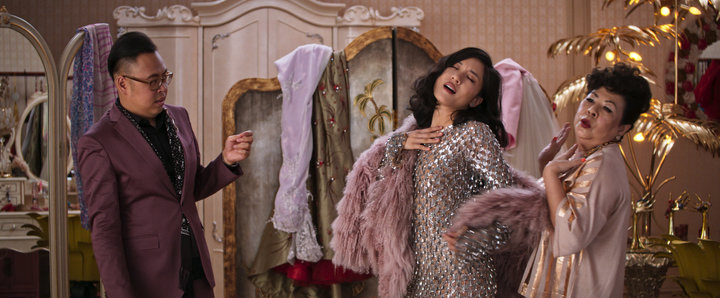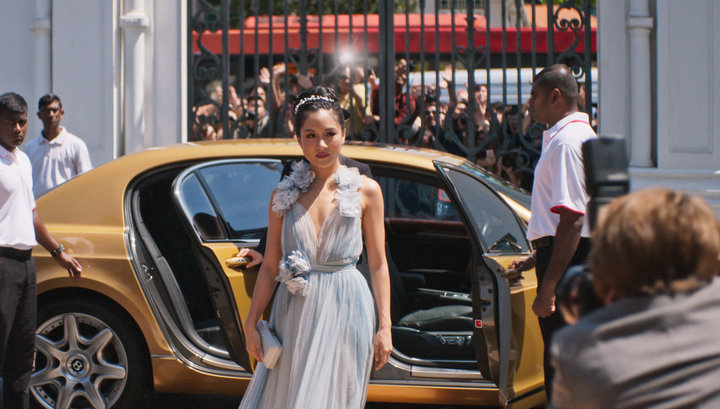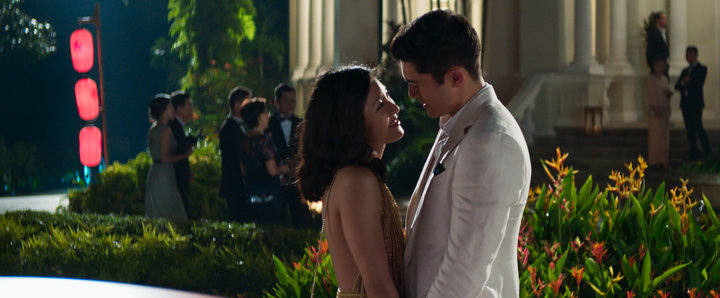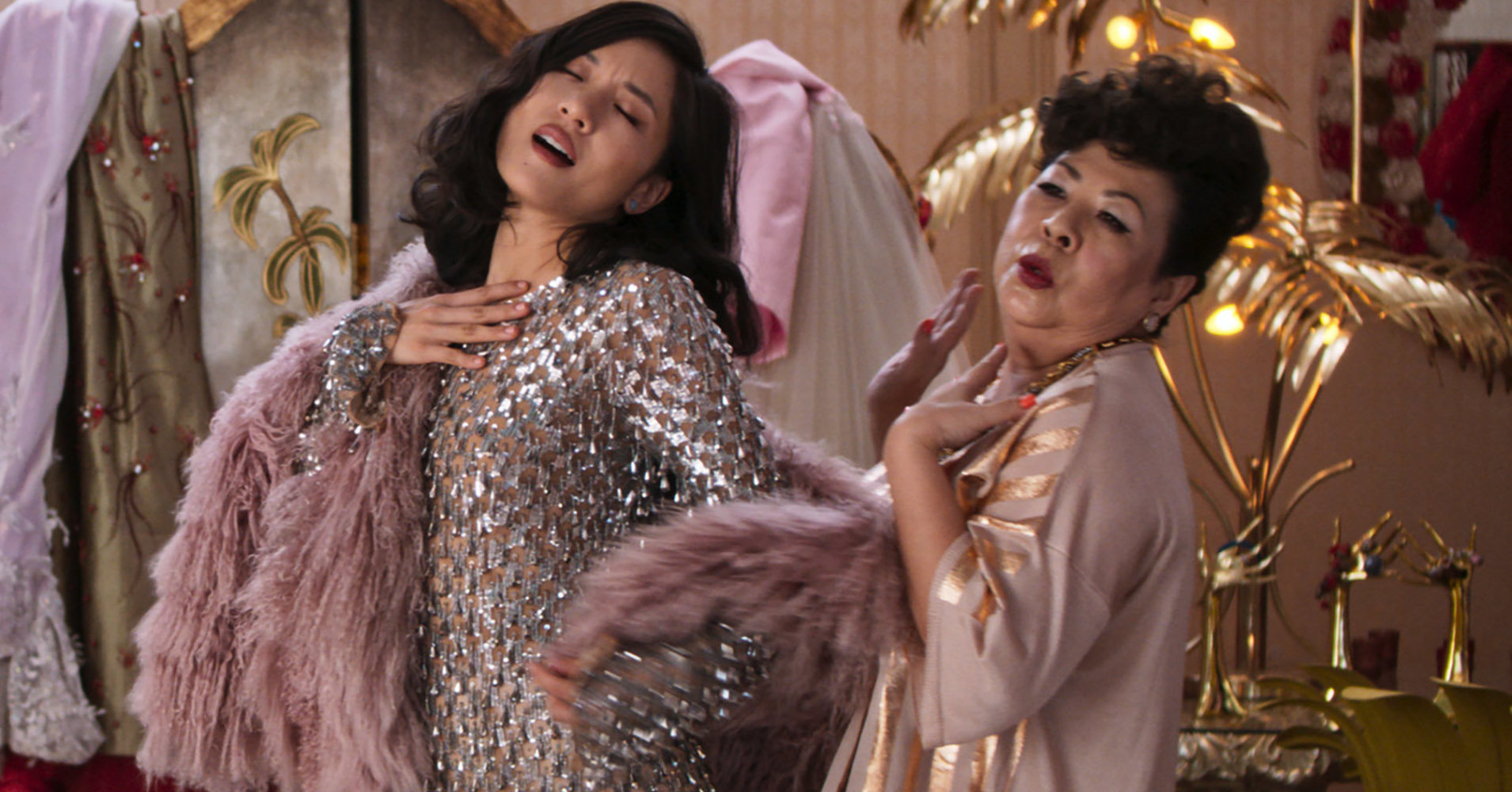[ad_1]
Living up to its title, “Crazy Rich Asians” takes place in a pop-chic material world defined by the breadth of one’s fortune.
When the movie’s American-born protagonist, Rachel Chu (Constance Wu), ventures to Singapore to attend a wedding with her boyfriend, Nick Young (Henry Golding), she faces the tall order of living up to his opulent family’s scrutiny. Because this is a romantic comedy full of impossibly beautiful people, there’s only one way to do that: a well-soundtracked makeover.
Rachel’s is a makeover only because, as an economics professor at New York University, her comfortable lifestyle doesn’t measure up to Nick’s family’s ludicrous real-estate capital. Even with an impressive career and a near-flawless physique, she is considered pedestrian. With the help of her college BFF (Awkwafina), Rachel tries on a series of dresses that might satisfy Nick’s disapproving mother (Michelle Yeoh), who has already decided Rachel is not good enough for her precious son. It’s Rachel’s empowering attempt to reclaim her dignity as she feels like more and more of a fish out of water, and it’s perfectly scored by Madonna’s “Material Girl,” a winking bop that satirizes society’s quest for luxury.
But there’s a twist: After the kicky drumbeat introduces the sequence, it’s not Madonna’s voice we hear. The song is instead sung by Sally Yeh — one of a few Chinese covers of American pop songs that garnish the movie, Hollywood’s first contemporary-set production to feature an all-Asian cast since “The Joy Luck Club” 25 years ago.

Warner Bros
While developing “Crazy Rich Asians,” music supervisor Gabe Hilfer and director Jon M. Chu compiled a list nearly 100 songs about ― what else? ― money. The roster included Kanye West’s “Gold Digger,” Hall & Oates’ “Rich Girl,” the Notorious B.I.G.’s “Mo Money Mo Problems,” Lady Gaga’s “Money Honey” and Barrett Strong’s “Money (That’s What I Want).”
Originally, the Cinderella makeover scene was one linear vignette set to “Gold Digger,” but Chu opted to chop it up, juxtaposing Rachel’s Dior, Michael Kors and Marchesa fittings with images of her arrival at the picturesque wedding.
The Kanye anthem didn’t quite work for the tone, meant to underscore the absurdity of Rachel needing to work so hard to win over her image-obsessed potential in-laws. So Hilfer thought to test Yeh’s Cantonese “Material Girl” cover, for which he and Chu desperately wanted to find a place in the movie. Just like that, the crisscrossing fashion feast came to life, adding a sense of victory as Rachel settles on a powder-blue tulle gown.
Madonna never weighed in on the use of her 1985 hit, at least not with Hilfer and Chu. They secured the rights from the song’s publisher, as well as the record label that owns Yeh’s arrangement.
“I hope that [Madonna] appreciates it, because I do feel like it was used in the spirit she intended it,” Hilfer said.

Warner Bros.
Landing the film’s other standout pop update, however, proved more arduous.
A key moment at the movie’s end needed a ballad with a familiar dramatic crest. Chu had his eye on Coldplay’s “Yellow,” partly as a way to take back a slur directed at Asian skin tones. For test screenings, Hilfer used a rendition from a Chinese edition of television’s “Idol” franchise. Audiences delighted at the sound of the opening guitar strum, and Hilfer knew it was their golden ticket.
“Just the emotion of the song and the build and the way that it felt and the vocal crescendo and the familiarity with the melody ― everything just worked so neatly and perfectly over a whole variety of scenes that were sewn together that created that one moment at the end that’s just such an emotional blast,” Hilfer said.
But Coldplay is picky about how its songs are used in other media, and Hilfer said frontman Chris Martin and the rest of the group wanted to see the movie before agreeing to hand over “Yellow.” A screening was arranged, but Chu and Hilfer started considering backups ― Rihanna’s “Stay” or perhaps a Sia track ― just in case things didn’t go their way. In the end, their fear was short-lived.
“I’ve never seen a response that fast,” Hilfer said. “The next morning, it was like, ‘They watched it. They love it. They love the movie.’”

Warner Bros.
Chu told a different story in an interview with Quartzy, saying it was an impassioned letter that persuaded the band, which had initially rejected the request, to let him use the song. “For the first time in my life, it described the color in the most beautiful, magical ways,” he wrote, according to the site, and within an hour, the group emailed him with its approval.
However it unfolded, Hilfer then commissioned a Mandarin cover performed by Katherine Ho, a former contestant from “The Voice” who is now a student at the University of Southern California. Working with the producer Cheapshot, she asked her parents to help with the dialect, and before she knew it, she was part of a movie starring her idol, Wu.
Altogether, “Crazy Rich Asians,” which also includes an English-language cover of Elvis Presley’s “Can’t Help Falling in Love” and an English-Chinese hybrid of “Money (That’s What I Want),” employs a pop soundtrack that rivals those of the best romantic comedies of the past 30 years. “Say Anything” had Peter Gabriel, “Pretty Woman” had Roy Orbison, “Sleepless in Seattle” had Harry Connick Jr., “She’s All That” had Sixpence None the Richer, “10 Things I Hate About You” had Frankie Valli, “Bridget Jones’s Diary” had Aretha Franklin, “(500) Days of Summer” had Hall & Oates.
But “Crazy Rich Asians” has Madonna and Coldplay, repurposed as cross-cultural revelries that follow Rachel on her journey eastward. Mixed in with vintage Chinese standards, “Material Girl” and “Yellow” let the film cleverly combine its Hollywood underwriting with its global import.
“We wanted people to be surprised to hear a version in Chinese of a song that they’re so familiar with that’s such a ubiquitous part of our musical language,” Hilfer said. “You hear ‘Material Girl,’ and 9 out of 10 people know that song. So to present people with a version that at least most Western audiences are probably not that familiar with, it’s kind of like we keep pulling these surprises out of our pocket. It keeps people on their toes to remember, yes, this is a familiar love story, but at the same time, this is a unique take on it in a setting that most people aren’t familiar with.”
CORRECTION: A previous version of this story indicated the Sally Yeh cover of “Material Girl” was in Mandarin instead of Cantonese.
[ad_2]
Source link

